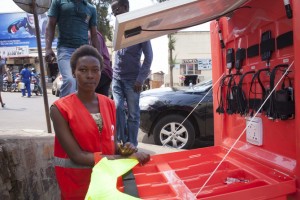Developing-world entrepreneurs are creating their own jobs without having to start their own companies. Instead, they are adopting proven models in education, health care and renewable energy and building badly needed distribution channels as franchisees.
Micro-franchising is emerging as a resilient and more reality-based alternative to standalone startups as a way to create jobs and scale solutions for the world’s poor. One Rwandan entrepreneur, Henri Nyakarundi, aims to recruit more than 50,000 women, refugees, disabled and other unemployed people to spread his solar-powered Internet kiosks across Africa.
[blockquote author=” Henri Nyakarundi, A.R.E.D.” pull=”pullleft”]“This is the hardest thing I’ve ever done in my life. People in Rwanda are not often given opportunities.[/blockquote]
Nyakarundi is not alone in tapping the micro-franchise opportunity, and challenge, in developing markets around the world. VisionSpring trains individual franchises and provides them with reading glasses to sell to remote populations. Living Goods has trained and engaged 1,300 “health promoters” to bring sanitary pads, diapers, soaps, and vitamins to households reaching about a million people in Uganda and Kenya.
Just last week the GCapital, the venture capital arm of Alphabet (formerly Google), invested in Cuemath, a Bangalore-based education startup that uses a micro-franchise model to help women build careers by providing after-school math classes in their homes.
“This model doesn’t require them to be entrepreneurial,” says Tracey Chambers, co-founder of The Clothing Bank in Capetown, which trains single mothers to repurpose and sell used clothing. “That’s the strength of franchises: they have a proven business model and system.”
The micro-franchise model, Chambers says, provides franchisees “a roadmap covering everything from access to supply chains, equipment and products, to routes to market, marketing and brand awareness, all of which have been pre-defined and refined by the franchisor.”
Connecting Mobile Users, Creating Jobs
Henri Nyakarundi was born to Rwandan refugees in Barundi. In 1996, fleeing civil war, Henri and his parents relocated to Atlanta, Georgia. He got a degree at Georgia State University and started a trucking company. Then he decided to move back.
“I could not go back empty handed,” Nyakarundi told ImpactAlpha. And he didn’t. Motivated by his own inability to find a charge for his mobile phone while on a trip to Burundi, Henri created African Renewable Energy Distributor (A.R.E.D.).

A.R.E.D. operates solar-powered portable kiosks that it positions in high-trafficked areas such as bus stops and health clinics. Initially the Kiosks allowed customers to charge their mobile phones. Now they provide wi-fi and a local intranet with pre-downloaded content.
In exchange for a one-time payment, which Nyakarundi says reduces the number of unmotivated applicants, A.R.E.D. provides the Kiosk, training and ongoing monitoring and support to franchisees. The franchisees make money selling add on services like mobile airtime, online surveys and other content. Three of its 30 kiosks are run by and serve refugees.
To prototype and roll out the first 30 kiosks, Nyakarundi raised more than $500,000 in grants and equity from Microsoft, Autodesk Foundation and Germany-based, Greentec Capital. In 2015, A.R.E.D. came away with a small investment and a network of investors after winning the vote of other Africa-based entrepreneurs in Village Capital’s business accelerator program. It recently launched a crowdfunding campaign, is testing a new streamlined prototype, and aims to raise more than $1 million later this year to roll out the next 300 kiosks.
“This is the hardest thing I’ve ever done in my life,” says Nyakarundi. “People in Rwanda are not often given opportunities.”
Proven Models, Remaining Challenges
Franchises in the United States support about one in eight jobs. In South Africa, where about a third of small and medium-sized startups fail, just one in ten franchises go out of business. Across the developing world, micro-franchising offers opportunity for those without formal education, sufficient capital and little exposure to entrepreneurial roles models, but a willingness to work hard and learn.
VisionSpring, the beneficiary of hip eyeglass distributor Warby Parker’s “buy one, give one” program, has trained more than 5,200 “vision entrepreneurs,” who have sold more than 360,000 pairs of eyeglasses in 40 countries.
In Uganda, a three-year randomized control study showed Living Goods products and services reduced the under-5 mortality rate by over 27 percent.
GCapital was so taken by Cuemath’s success that it led a $15 million Series B round to help the company reach 5000 tutors and 40,000 students.
Financial sustainability remains a challenge. Most frontier markets, says a 2015 report from Dalberg, “lack the purchasing power, access to capital, legal and regulatory framework, and technical advisory services that enable most business format franchises to grow profitably.”
Getting all that right is key. With 600 million young people expected to compete for 200 million jobs in the coming decade, such “businesses in a box” could help many of them create their own jobs.











